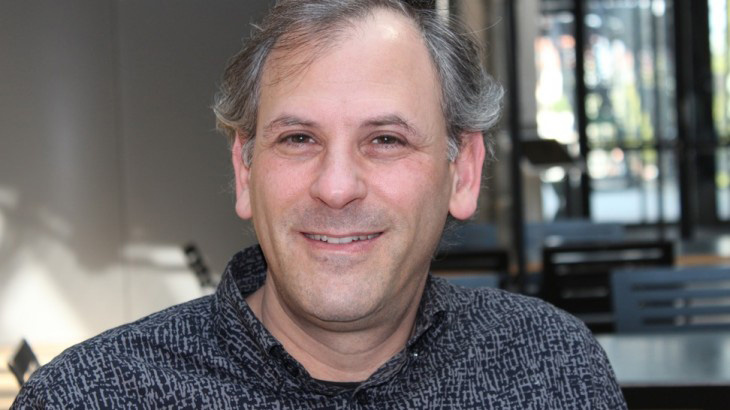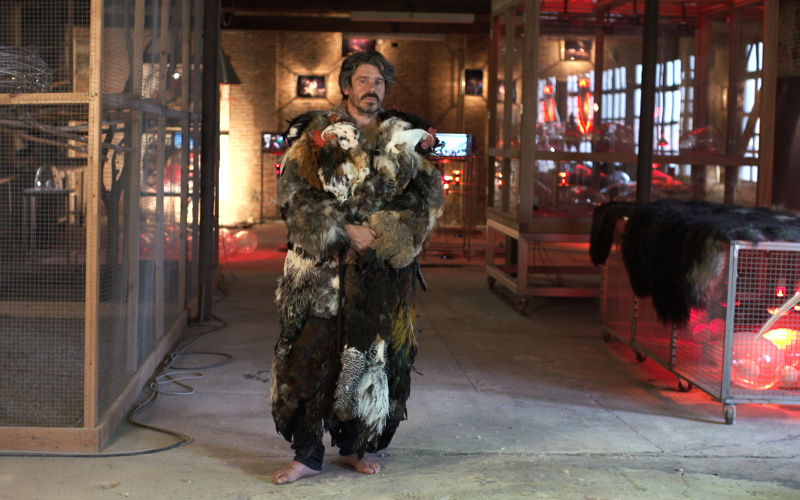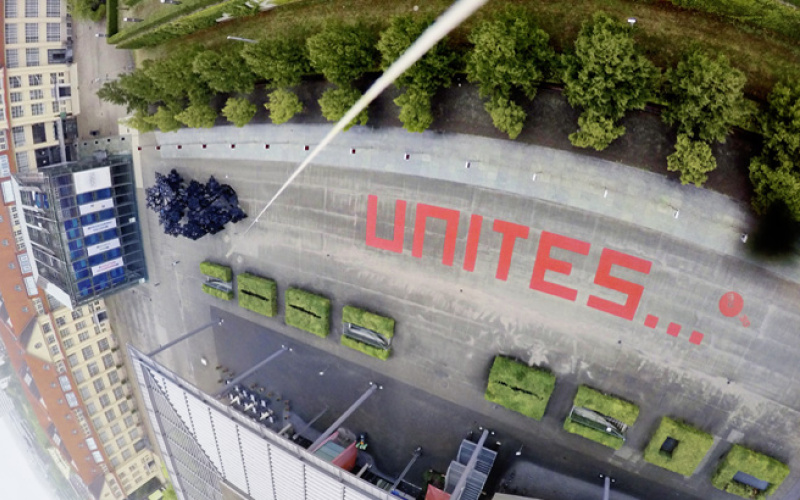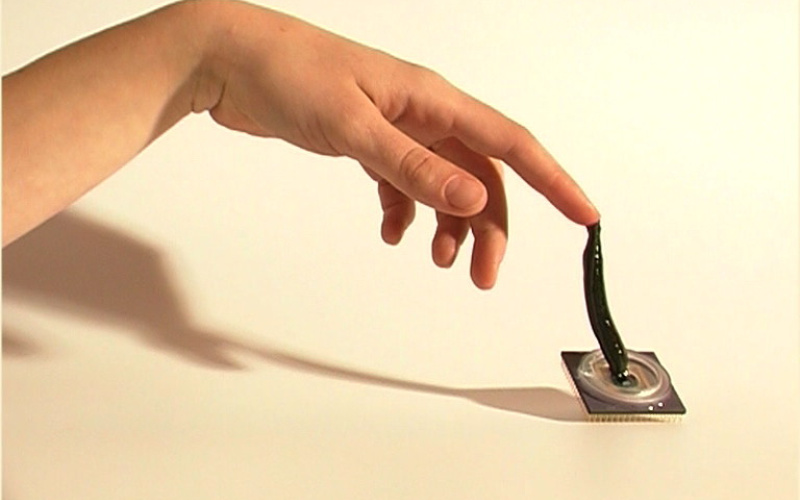An Interview with Eric Lyon
The North American composer Eric Lyon was awarded with the 2011 Giga Hertz Prize for production.
BY TILL KNIOLA
The basis was a composition he submitted entitled “Clusters - First Movement”, an eight-channel piece comprising computer-generated piano sounds. In August 2012 Lyon was at the Institute for Music and Acoustics once again in order to complete a further development of the original work. Eric Lyon (born in 1962) is a trained violinist. The idea of becoming a composer first came to him at the early age of eleven. The initiative was sparked by an auditory experience of Paul Hindemith’s work for string orchestra op. 44 No. 4 in five pieces, which was broadcast on the radio during a car trip with his father. On enquiring into the music, his father replied with something to the effect that it involved a modern composer who wrote difficult and dissonant music.
»From then on I was transfixed; I wanted to know more about this ‘difficult’ stuff, because it simply moved me emotionally very strongly.« – Eric Lyon
Eric Lyon subsequently sought to listen to as many recordings by modern composers he could lay his hands on; he became particularly fond of the music by Elliot Carter and Iannis Xenakis. For him the sound was always an emotional one – a fact which was also to become influential for his own compositions.
»Criticism of contemporary music often describes it as being overly intellectual. In my view, however, intellect and emotion are inseparable: both belong together. A piece complex in structure or with strange sounds should grab me and move me; only then do I know how to appreciate it.« – Eric Lyon
His first steps as a composer were prompted by early emotional experiences of the Hindemithian world of sounds. With a cassette recorder Eric Lyon recorded his own violin playing, switched on the recording before directly playing an additional voice. This drive was a playful-emotional one: the young research composer sought to discover how written music sounded.
»I was overwhelmed by the beauty of the experience. You write something down with a particular idea in mind, and then listen to the execution of how it actually sounds. To be sure, my first attempts as a young boy were primitive and simple, but it is just this experience that I have come to value as one of the most important aspects of composing.« – Eric Lyon
Eric Lyon sought, above all else, to compose instrumental music. However, due to his “young composer’s megalomania” (Lyon) was felt compelled to turn to electronic music: at the time there were barely any instrumentalists who wished or even could play his early pieces. In Tanglewood Summer Camp at Boston University, and at Aspen Music Festival as a young composer he met musicians who were to become genuine companions, such as guitarist Seth Josel. Eric Lyon studied composition at Princeton University under Paul Lansky, at the Eastman School of Music and at the University of California, San Diego. He discovered the music of Karlheinz Stockhausen while at Princeton in the 1980s. Here, along with a group of budding enthusiasts, he pursued the idea of computer music as an extension of instrumental composition. Lyon recalls the initial laborious steps of this new compositional technology.
“In Princeton, one would sit down at a terminal in a computer room and create one’s score, which one would then hand over to an expert who ‘translated’ the notation and recorded it on to tape. One than had to hike fifteen minutes across campus and play the music, together with the music that had just been composed, in a building with a monitoring station: an extremely tedious process.” – Eric Lyon
However, it was during this period that Lyon’s idea of composing with sound was to mature; the attempt was to exhaust all possible methods of sound processes of a particular piece of original material by electronic means. It was following his discovery Heinrich Schenker’s writings (1868-1935) during his studies at the Eastman School in Rochester that Lyon began developing an interest in theory.
“In the USA at the time Schenker was studied intensively, most likely since several of his students had emigrated there. Even though, as a person, he was certainly not unproblematic, his principles of the “organic unity of tonal music” were extremely fascinating. Essentially, the claim was that it was not harmonies that constituted the foundation of tonal music, but counterpoint. He arrived at this view by way of the analysis of grand musical form which he would repeatedly reduce and tie down to fundamental structures. It was just such ideas as these that I found very useful for my work as a composer.” – Eric Lyon
Eric Lyon completed his work which originally was to be titled “Clusters – Movement 2” at the Institute for Music and Acoustics. This piece was conceived as a continuation of the work “Clusters - First Movement” of a previously recorded piano sound combined by means of a computer control system and divided across eight loudspeakers positioned around the space. For the second movement, Lyon planned to refine the distribution of sound within the space. However, when processing the sound the piece began developing a life of its own and took him in an entirely different direction. When subjected to time stretching the piano sounds suddenly became very dark and opaque audibly and created their own event space. Eric Lyon then further modulated and shaped this space by means of sound processing; as a result the ZKM_Cube became an instrument facilitating the emergence of this sound-experience-space. As a consequence of this work he changed the title of the song to “Spirits“:
“I sought to create a dream-like state in which the sounds were cancelled out by a higher through-flow, and where the sense of time was suspended.” – Eric Lyon
The premier performance of “Spirits” may be experienced on the 22 November in the ZKM_Cube. Lyon’s extended stay in Japan which lasted several years and the contact to the local music and culture there was also influential. In a certain sense, it was this perspectival shift that liberated him as a composer and, as remarking of himself, prompted him to abandon several of the prejudices and fixed ideas about music. Interest in the integration of noise in his music, for example, derives from the “Japanese period”. His understanding of art, which can be formulated in entirely abstract, formalist music, goes back to the period he spent in the Far East.
“Music ought to edify us, and can empower us spiritually. It achieves this aim if the ideas it contains are strong and powerful. This has less to do with expression or influencing what the audience is supposed to feel when listening to my music - especially since this is something one cannot control.” – Eric Lyon
It is for this reason that Lyon clearly renounces the notion of a “message”, or strictly political-thematic references in his music. His primarily concern has been to extend sound either in his works for ensemble and orchestra, or in purely electronic pieces. Lyon has been working intensively on the further development of various software tools for composers for several years, and as theorist of sound enhancement, he holds lectures at international conferences. He teaches computer music at the School of Creative Arts at Queen's University in Belfast. He works together with classic musicians and ensembles, is a performer of his own pieces – often together with musicians beyond the New Music scene such as Zbigniew Karkowski.
About the artist
Eric Lyons Website: http://www.somasa.qub.ac.uk/~elyon/



